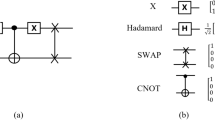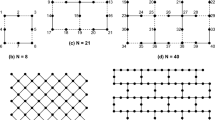Abstract
The performance of current quantum computers is limited by high error rates and few qubits. Nevertheless, more and more quantum computers are available in the cloud. Selecting a suitable quantum computer to execute a specific quantum circuit and receive precise results can be difficult. At the same time, it is crucial to choose an available quantum computer that offers the hardware characteristics required by the circuit to retrieve precise results, depending on the quantum computer’s last re-calibration and the quantum compiler that maps the circuit to the hardware. Furthermore, cloud providers regulate hardware access, so waiting times must be considered. To support the choice of a quantum computer, we introduced an automated framework in previous work. It enables the user to analyze and prioritize the compiled circuits of a given input circuit for different quantum computers based on their requirements. In this work, we extend the framework by automating the prioritization of compiled circuits targeting short waiting times and precise executions based on previous results. We present our framework’s prototype and case study to demonstrate and evaluate the practical feasibility.
Access this chapter
Tax calculation will be finalised at checkout
Purchases are for personal use only
Similar content being viewed by others
Notes
- 1.
- 2.
- 3.
- 4.
- 5.
References
Dodge, Y.: Spearman rank correlation coefficient. In: Dodge, Y. (ed.) The Concise Encyclopedia of Statistics, pp. 502–505. Springer, New York (2008). https://doi.org/10.1007/978-0-387-32833-1_379
Aleksandrowicz, G., et al.: Qiskit: An Open-source Framework for Quantum Computing (2019). https://doi.org/10.5281/zenodo.2562111
Alpaydin, E.: Machine Learning: The New AI. MIT Press, Cambridge (2016)
Balugani, E., Lolli, F., Butturi, M.A., Ishizaka, A., Sellitto, M.A.: Logistic regression for criteria weight elicitation in PROMETHEE-based ranking methods. In: Ahram, T., Karwowski, W., Vergnano, A., Leali, F., Taiar, R. (eds.) IHSI 2020. AISC, vol. 1131, pp. 474–479. Springer, Cham (2020). https://doi.org/10.1007/978-3-030-39512-4_74
Barzen, J.: From Digital Humanities to Quantum Humanities: Potentials and Applications (2022, to appear). https://doi.org/10.48550/ARXIV.2103.11825
Bączkiewicz, A., Kizielewicz, B., Shekhovtsov, A., Wątróbski, J., Sałabun, W.: Methodical aspects of MCDM based E-commerce recommender system. J. Theor. Appl. Electron. Commer. Res. 16(6), 2192–2229 (2021). https://doi.org/10.3390/jtaer16060122
Bilbao-Terol, A., Arenas-Parra, M., Cañal-Fernández, V., Antomil-Ibias, J.: Using TOPSIS for assessing the sustainability of government bond funds. Omega 49, 1–17 (2014). https://doi.org/10.1016/j.omega.2014.04.005
Bös, J.: Numerical optimization of the thickness distribution of three-dimensional structures with respect to their structural acoustic properties. Struct. Multidiscip. Optim. 32(1), 12–30 (2006). https://doi.org/10.1007/s00158-005-0560-y
Brans, J.-P., Mareschal, B.: Promethee methods. In: Figueira, J., Greco, S., Ehrogott, M. (eds.) Multiple Criteria Decision Analysis: State of the Art Surveys. ISORMS, vol. 78, pp. 163–186. Springer, New York (2005). https://doi.org/10.1007/0-387-23081-5_5
Choi, K., Jang, D.H., Kang, S.I., Lee, J.H., Chung, T.K., Kim, H.S.: Hybrid algorithm combing genetic algorithm with evolution strategy for antenna design. IEEE Trans. Magn. 52(3), 1–4 (2016). https://doi.org/10.1109/TMAG.2015.2486043
Cowtan, A., Dilkes, S., Duncan, R., Krajenbrink, A., Simmons, W., Sivarajah, S.: On the qubit routing problem. In: 14th Conference on the Theory of Quantum Computation, Communication and Cryptography (TQC 2019). Leibniz International Proceedings in Informatics (LIPIcs), vol. 135, pp. 5:1–5:32. Schloss Dagstuhl-Leibniz-Zentrum fuer Informatik (2019). https://doi.org/10.4230/LIPIcs.TQC.2019.5
Edwards, W.: How to use multiattribute utility measurement for social decisionmaking. IEEE Trans. Syst. Man Cybern. 7(5), 326–340 (1977). https://doi.org/10.1109/TSMC.1977.4309720
Fogel, D.: An introduction to simulated evolutionary optimization. IEEE Trans. Neural Networks 5(1), 3–14 (1994). https://doi.org/10.1109/72.265956
Gao, R., Nam, H.O., Ko, W.I., Jang, H.: National options for a sustainable nuclear energy system: MCDM evaluation using an improved integrated weighting approach. Energies 10(12) (2017). https://doi.org/10.3390/en10122017
Garcia-Alonso, J., Rojo, J., Valencia, D., Moguel, E., Berrocal, J., Murillo, J.M.: Quantum software as a service through a quantum API gateway. IEEE Internet Comput. 26(1), 34–41 (2022). https://doi.org/10.1109/MIC.2021.3132688
Geldermann, J., Lerche, N.: Leitfaden zur Anwendung von Methoden der multikriteriellen Entscheidungsunterstützung. Promethee, Methode (2014)
Grossi, M., et al.: A serverless cloud integration for quantum computing (2021)
Guo, M., Zhang, Q., Liao, X., Chen, F.Y., Zeng, D.D.: A hybrid machine learning framework for analyzing human decision-making through learning preferences. Omega 101, 102263 (2021). https://doi.org/10.1016/j.omega.2020.102263
Hassan, M., Hamada, M.: Genetic algorithm approaches for improving prediction accuracy of multi-criteria recommender systems. Int. J. Comput. Intell. Syst. 11, 146–162 (2018). https://doi.org/10.2991/ijcis.11.1.12
Holland, J.H.: Genetic algorithms and the optimal allocation of trials. SIAM J. Comput. 2(2), 88–105 (1973). https://doi.org/10.1137/0202009
Hwang, C.L., Yoon, K.: Methods for multiple attribute decision making. In: Hwang, C.-L., Yoon, K. (eds.) Multiple Attribute Decision Making, pp. 58–191. Springer, Heidelberg (1981). https://doi.org/10.1007/978-3-642-48318-9_3
LaRose, R.: Overview and comparison of gate level quantum software platforms. Quantum 3, 130 (2019). https://doi.org/10.22331/q-2019-03-25-130
Leymann, F., Barzen, J.: The bitter truth about gate-based quantum algorithms in the NISQ era. Quantum Sci. Technol. 5(4), 1–28 (2020). https://doi.org/10.1088/2058-9565/abae7d
Leymann, F., Barzen, J., Falkenthal, M., Vietz, D., Weder, B., Wild, K.: Quantum in the cloud: application potentials and research opportunities. In: Proceedings of the 10th International Conference on Cloud Computing and Services Science (CLOSER 2020), pp. 9–24. SciTePress (2020)
Li, P., Qian, H., Wu, J., Chen, J.: Sensitivity analysis of TOPSIS method in water quality assessment: I. Sensitivity to the parameter weights. Environ. Monit. Assess. 185(3), 2453–2461 (2013). https://doi.org/10.1007/s10661-012-2723-9
Luu, C., von Meding, J., Mojtahedi, M.: Analyzing Vietnam’s national disaster loss database for flood risk assessment using multiple linear regression-topsis. Int. J. Disaster Risk Reduct. 40, 101153 (2019). https://doi.org/10.1016/j.ijdrr.2019.101153
Magesan, E., et al.: Efficient measurement of quantum gate error by interleaved randomized benchmarking. Phys. Rev. Lett. 109, 080505 (2012). https://doi.org/10.1103/PhysRevLett.109.080505
Mojtahedi, S., Oo, B.: Coastal buildings and infrastructure flood risk analysis using multi-attribute decision-making. J. Flood Risk Manag. 9(1), 87–96 (2016). https://doi.org/10.1111/jfr3.12120
Olson, D.: Comparison of weights in topsis models. Math. Comput. Model. 40(7), 721–727 (2004). https://doi.org/10.1016/j.mcm.2004.10.003
Orak, S., Arapoğlu, R.A., Sofuoğlu, M.A.: Development of an ANN-based decision-making method for determining optimum parameters in turning operation. Soft. Comput. 22(18), 6157–6170 (2017). https://doi.org/10.1007/s00500-017-2682-8
Pathak, S. (ed.): Intelligent Manufacturing. MFMT, Springer, Cham (2021). https://doi.org/10.1007/978-3-030-50312-3
Pellow-Jarman, A., Sinayskiy, I., Pillay, A., Petruccione, F.: A comparison of various classical optimizers for a variational quantum linear solver. Quantum Inf. Process. 20(6), 1–14 (2021). https://doi.org/10.1007/s11128-021-03140-x
Powell, M.: A view of algorithms for optimization without derivatives. Math. TODAY 43 (2007)
Powell, M.J.D.: A direct search optimization method that models the objective and constraint functions by linear interpolation. In: Gomez, S., Hennart, J.P. (eds.) Advances in Optimization and Numerical Analysis, pp. 51–67. Springer, Dordrecht (1994). https://doi.org/10.1007/978-94-015-8330-5_4
Preskill, J.: Quantum computing in the NISQ era and beyond. Quantum 2, 79 (2018). https://doi.org/10.22331/q-2018-08-06-79
Ravi, G.S., Smith, K.N., Murali, P., Chong, F.T.: Adaptive job and resource management for the growing quantum cloud (2021)
Ros, J.C.: Introduction to Decision Deck-Diviz: Examples User Guide. Departament d’Enginyeria Informàtica i Matemàtiques (2011)
Sałabun, W., Wątróbski, J., Shekhovtsov, A.: Are MCDA methods benchmarkable? A comparative study of TOPSIS, VIKOR, COPRAS, and PROMETHEE II methods. Symmetry 12(9) (2020). https://doi.org/10.3390/sym12091549
Salm, M., Barzen, J., Breitenbücher, U., Leymann, F., Weder, B., Wild, K.: The NISQ analyzer: automating the selection of quantum computers for quantum algorithms. In: Dustdar, S. (ed.) SummerSOC 2020. CCIS, vol. 1310, pp. 66–85. Springer, Cham (2020). https://doi.org/10.1007/978-3-030-64846-6_5
Salm, M., Barzen, J., Leymann, F., Weder, B.: About a criterion of successfully executing a circuit in the NISQ era: what \(wd \ll 1/\epsilon _\text{eff}\) really means. In: Proceedings of the 1st ACM SIGSOFT International Workshop on Architectures and Paradigms for Engineering Quantum Software (APEQS 2020), pp. 10–13. ACM (2020). https://doi.org/10.1145/3412451.3428498
Salm, M., Barzen, J., Leymann, F., Weder, B.: Prioritization of compiled quantum circuits for different quantum computers. In: Proceedings of the 2022 IEEE International Conference on Software Analysis, Evolution and Reengineering (SANER 2022), pp. 1258–1265. IEEE (2022). https://doi.org/10.1109/SANER53432.2022.00150
Salm, M., Barzen, J., Leymann, F., Weder, B., Wild, K.: Automating the comparison of quantum compilers for quantum circuits. In: Barzen, J. (ed.) SummerSOC 2021. CCIS, vol. 1429, pp. 64–80. Springer, Cham (2021). https://doi.org/10.1007/978-3-030-87568-8_4
Sivarajah, S., Dilkes, S., Cowtan, A., Simmons, W., Edgington, A., Duncan, R.: t\(|\)ket\(\rangle \): a retargetable compiler for NISQ devices. Quantum Sci. Technol. 6, 014003 (2020). https://doi.org/10.1088/2058-9565/ab8e92
Spearman, C.: The proof and measurement of association between two things. In: Studies in Individual Differences: The Search for Intelligence, pp. 45–58 (1961). https://doi.org/10.1037/11491-005
Swain, M.J., Ballard, D.H.: Color indexing. Int. J. Comput. Vision 7(1), 11–32 (1991). https://doi.org/10.1007/BF00130487
Tannu, S.S., Qureshi, M.K.: Not all qubits are created equal: a case for variability-aware policies for nisq-era quantum computers. In: Proceedings of the Twenty-Fourth International Conference on Architectural Support for Programming Languages and Operating Systems, ASPLOS 2019, pp. 987–999. ACM (2019). https://doi.org/10.1145/3297858.3304007
University of Stuttgart: NISQ Analyzer Content Repository (2022). https://github.com/UST-QuAntiL/nisq-analyzer-content/tree/paper/optimizing-prioritization/prioritization-based-on-learned-weights
Vietz, D., Barzen, J., Leymann, F., Wild, K.: On decision support for quantum application developers: categorization, comparison, and analysis of existing technologies. In: Paszynski, M., Kranzlmüller, D., Krzhizhanovskaya, V.V., Dongarra, J.J., Sloot, P.M.A. (eds.) ICCS 2021. LNCS, vol. 12747, pp. 127–141. Springer, Cham (2021). https://doi.org/10.1007/978-3-030-77980-1_10
Wang, J.J., Jing, Y.Y., Zhang, C.F., Zhang, X.T., Shi, G.H.: Integrated evaluation of distributed triple-generation systems using improved grey incidence approach. Energy 33(9), 1427–1437 (2008). https://doi.org/10.1016/j.energy.2008.04.008
Wang, J.J., Jing, Y.Y., Zhang, C.F., Zhao, J.H.: Review on multi-criteria decision analysis aid in sustainable energy decision-making. Renew. Sustain. Energy Rev. 13(9), 2263–2278 (2009). https://doi.org/10.1016/j.rser.2009.06.021
Wątróbski, J., Jankowski, J., Ziemba, P., Karczmarczyk, A., Zioło, M.: Generalised framework for multi-criteria method selection. Omega 86, 107–124 (2019). https://doi.org/10.1016/j.omega.2018.07.004
Wątróbski, J., Jankowski, J., Ziemba, P., Karczmarczyk, A., Zioło, M.: MCDA Method Selection Tool (2021). http://mcda.it
Weder, B., Barzen, J., Leymann, F., Salm, M., Wild, K.: QProv: a provenance system for quantum computing. IET Quantum Commun. 2(4), 171–181 (2021). https://doi.org/10.1049/qtc2.12012
Wundrack, P.: Quantenunterstütztes Clustering mit hybriden neuronalen Netzen. Master’s thesis (2021). http://dx.doi.org/10.18419/opus-11422
Acknowledgements
This work was partially funded by the BMWK project PlanQK (01MK20005N).
Author information
Authors and Affiliations
Corresponding author
Editor information
Editors and Affiliations
Rights and permissions
Copyright information
© 2022 The Author(s), under exclusive license to Springer Nature Switzerland AG
About this paper
Cite this paper
Salm, M., Barzen, J., Leymann, F., Wundrack, P. (2022). Optimizing the Prioritization of Compiled Quantum Circuits by Machine Learning Approaches. In: Barzen, J., Leymann, F., Dustdar, S. (eds) Service-Oriented Computing. SummerSOC 2022. Communications in Computer and Information Science, vol 1603. Springer, Cham. https://doi.org/10.1007/978-3-031-18304-1_9
Download citation
DOI: https://doi.org/10.1007/978-3-031-18304-1_9
Published:
Publisher Name: Springer, Cham
Print ISBN: 978-3-031-18303-4
Online ISBN: 978-3-031-18304-1
eBook Packages: Computer ScienceComputer Science (R0)




